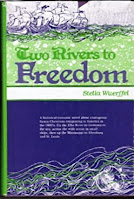[2025-08-31 updated link to Wuerffel book]
This continues from Part 21 (Table of Contents in Part 3), a series presenting an English translation of Pastor Christian Hochstetter's 1885 496-page book entitled (abbreviated) The History of the Missouri Synod, 1838-1884. — This final installment to the series has the unpleasant task of exposing the many criticisms made by LC-MS theologians and leaders against Hochstetter's History.Walter O. Forster: Zion on the Mississippi
Rather than list all the many criticisms and innuendos by Forster against Hochstetter (and others), I will repeat a comment by Stella Wuerffel († 1994, Find-A-Grave), author of the 1980 book Two Rivers to Freedom [2025-08-31 updated link] (see here), concerning Forster's reliability as a historian of church matters. Wuerffel, in her book which is descriptive of the 1838-39 Saxon Lutheran Emigration and contains a surprisingly laudatory "Foreword" by CHI Director August Suelflow, states her "Preface", p. iii [2025-08-31 added link] (my emphasis):
"Walter Förster's opinionated interpretation of these events and people"
"Opinionated"? – I had to laugh out loud when I read this comment by the dear Ms. Wuerffel, for she is the only writer I have found who publicly pronounced the proper judgment of Forster's work. Needless to say, Ms. Wuerffel would hardly judge Hochstetter the same as Forster. — Dr. August Suelflow stated of author Wuerffel that "she undoubtedly knows the events described more intimately than any other living person."
Carl S. Mundinger: Government in the Missouri Synod, p. 17-18:
Mundinger may be less caustic than Forster in his criticism's, but he is essentially in the same camp. We see this in his Springfielder essay “Carl Ferdinand Wilhelm Walther Churchman” where he states of Schieferdecker’s exclamation over the Altenburg Theses, p. 28-29: “Whether it was really the 'Easter Day' of the bedeviled colony, as one of the participants, the exuberant Schieferdecker, later called it, may be questioned.” Leave it to an LCMS historian, Mundinger, to kill the "exuberance" over Walther's great work! Mundinger echos the comments of the opponents of the Old Missouri. Sad for the LC-MS. Mundinger's history also "may be questioned".The traditional way of describing the spiritual side of life in Saxony during the early decades of the nineteenth century is to call it the Age of Rationalism. Usually such adjectives as “dark,” “bleak,” “sterile,” and “oppressive” are added to make the picture supposedly complete. Writers, particularly those in the Missouri Synod, assume that rationalism was exclusively dominant [a misleading, or false, statement, otherwise what was the Prussian Union about if rationalism wasn't dominant?; exceptions were pointed out: Rudelbach, Harless, Guericke, Brunn, Zorn, Scheibel, even Loehe, and others are specifically pointed out as welcome exceptions], that it was growing in power during this decade and that it was making life progressively impossible for those who wished to maintain a Bible-centered faith. (Hochstetter, Die Geschichte der Evangelisch-Lutherischen Missouri Synode… ) … p. 18: Aside from the fact that it is frequently misleading and quite often inaccurate and unhistorical to call a certain number of years that have been deftly dated at both ends an “age” of something, rationalism in Saxony during the fourth decade of the nineteenth century was lacking in vigor. It was definitely on the decline [Ms. Wuerffel's book is another testimony against Mundinger's false judgment].
Wilbert Rosin, in his "Preface" to Dr. Fred Kramer's 1987 English translation of Walther's The Congregation’s Right To Choose Its Pastor said (p. VI) :
Parenthetically we might note that a half century later Christian Hochstetter in his history of the Missouri Synod speaks of differences between Stephan and Walther even before they came to America, differences which allegedly [Rosin follows Forster's "opinionated" questioning attitude] caused Stephan to suspect Walther and even assign a roommate to spy on Walther. No proof is supplied. [Hochstetter's "imagination"?] Walther approved this writing. [Walther would not approve slander against Stephan. Neither did Stella Wuerffel.] Walther offers no hint of this. [Walther cared primarily about the doctrinal issue, "doctrine vs. life".] That Walther was chosen to go from Saint Louis to Perry County to confront Stephan in 1839 may have stirred Hochstetter's imagination and influenced his memory and interpretation five decades later. [Where is Rosin's objectivity now?? Rosin has already passed judgment by airing this conjecture. The "opinionated" spirit of the LC-MS and Forster…]Consider that Hochstetter wrote just two decades after Leopold von Ranke attempted to write his history of the papacy wie es eigentlich gewesen [how it actually was] and historians were just beginning to stress the importance of objectivity in historical writing. [Rosin values so-called "objectivity" over spiritual understanding, over doctrine? See Pieper on "Historical Theology"]
It should be noted that Prof. Rosin also stated in his Preface to this 1987 translation:
"We were overjoyed when Dr. Kramer volunteered to translate Walther's Das Gemeindewahlrecht just when we were finding it impossible to carry out the project in time for a graduate course. Dr. Kramer worked swiftly but carefully, thereby making our task much easier."
This was 3 years after Kramer had finished his translation of Hochstetter's History in 1984. Could it be that Dr. Kramer was strengthened greatly by Hochstetter so that he "volunteered" to translate Walther's writing, having learned of the truthfulness and very real orthodoxy of Old Missouri? (Where are the volunteers to translate Walther today?)
In the next Part 22b, more criticisms of Hochstetter by other LC-MS theologians.


No comments:
Post a Comment
Comments only accepted when directly related to the post.